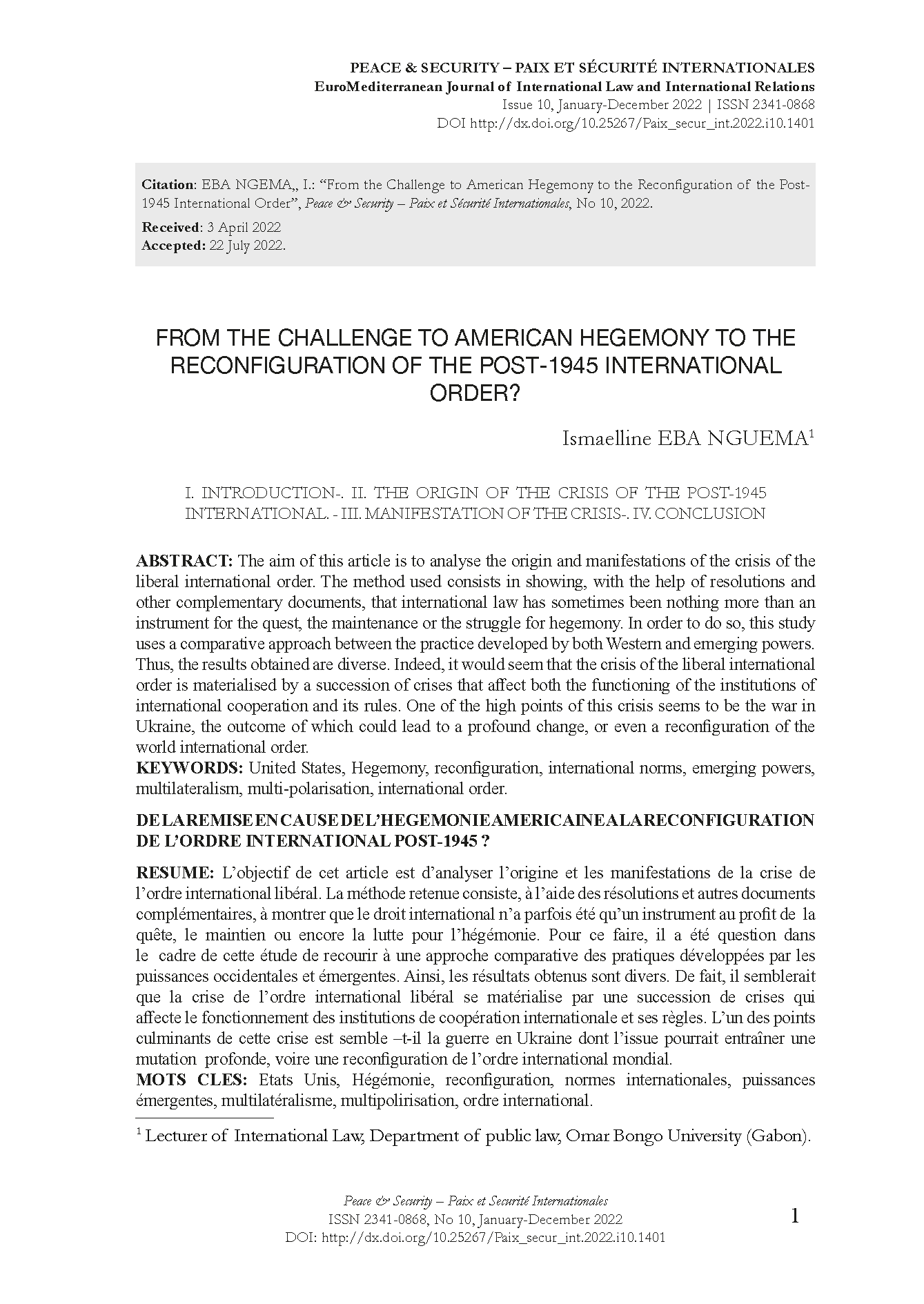From the Challenge to American Hegemony to the Reconfiguration of the Post-1945 International Order
Resumen
¿DEL DESAFÍO A LA HEGEMONÍA ESTADOUNIDENSE A LA RECONFIGURACIÓN DEL ORDEN INTERNACIONAL POSTERIOR A 1945?
El objetivo de este artículo es analizar el origen y las manifestaciones de la crisis del orden internacional liberal. El método utilizado consiste en demostrar, con la ayuda de resoluciones y otros documentos complementarios, que el derecho internacional no ha sido a veces más que un instrumento de búsqueda, mantenimiento o incluso de lucha por la hegemonía. Para ello, este estudio utiliza un enfoque comparativo entre la práctica desarrollada por las potencias occidentales y las emergentes. Así, los resultados obtenidos son diversos. En efecto, parece que la crisis del orden internacional liberal se materializa en una sucesión de crisis que afectan tanto al funcionamiento de las instituciones de la cooperación internacional como a sus reglas. Uno de los puntos álgidos de esta crisis parece ser la guerra en Ucrania, cuyo resultado podría provocar un cambio profundo, o incluso una reconfiguración del orden internacional mundial.
Palabras clave
Descargas
Cómo citar
Licencia

Esta obra está bajo una licencia internacional Creative Commons Atribución-NoComercial 4.0.
Copyright
Es condición para la publicación que el autor o autores ceda(n) a la Revista, en exclusiva, los derechos de reproducción. Paix et Sécurité Internationales es una revista que proporciona un acceso abierto inmediato a su contenido totalmente gratuito para lectores como para los investigadores que pretendan publicar en ella, ya que no se realizan cobros por concepto de envío, procesamiento ni publicación. Los usuarios podrán leer, descargar, copiar, distribuir, imprimir, buscar o enlazar el texto completo de los artículos publicados, o utilizarlos para cualquier otro propósito, dentro de la legalidad vigente. Y podrán hacerlo sin coste alguno, y sin necesitad de solicitar permiso al editor a al autor. Todo ello de acuerdo con la definición de acceso abierto de la Iniciativa Acceso Abierto de Budapest.
Citas
BIRDSALL, N; DE LA TORRE, A; VALENCIA CAICEDO, F. The Washington consensus: assessing a damage brand, World Bank and Center for Global Development, 2010.
CARREAU, D., et al, Droit international économique, Dalloz, 6ème édition, 2017, pp.62-156.
CHOUKROUNE, L. “China and the WTO settlement system: the global trade lawyer and the state capitalist”, China perspectives, n°1, 2012, pp.49-57.
COT, J-P., PELLET, A. FORTEAU, M. Charter of the United Nations, 3ème Economica edition, 2005, pp.401-404.
DAGI, D. “The Russian stand on the responsibility to protect: does Strategic culture matter?” Journal of Asian Security and International Affairs, vol 7, Issue 3, 2020, pp. 370-386.
DAWDA, S. “To what extent does international law reflect the sovereign will of states?”, E-International Relations, 2016.
DUNCOMBE, C., DUNNE, T. “After internationalism”, International Affairs, vol 94, no I (2018), p.30.
EBA NGUEMA, I. Securité alimentaire et libéralisation commerciale, Thèse de doctorat, Université Mohammed V Rabat, 2018, p.170, 229, 247.
FERLET, P., SARTRE, P. “La cour pénale internationale à la lumière des positions américaines et françaises”, vol 2, Tome 406, Etudes, 2007, p.171.
GORE, C. “The Rise and fall of the Washington consensus as a paradigm for developing countries”, World Developement, vol 28, Issue 5, 2000, pp.784-804.
GÖTZ, E., AND MERLEN, C-R. “Russia and the question of world order”, European Politics and Society, vol 20, n°2, 2020, pp.133-153.
IKENBERRY, J. “The end of the liberal order?”, International Affairs, Vol 94, n°1, 2018, pp.7-23.
IKENBERRY, J. “Liberal internationalism 3.0: America and dilemmas of liberal world order”, Perspectives on politics, Vol 7, n°1, 2009, pp.73-79.
ISAKHAN, B. “Introduction The Iraq Legacies Intervention, Occupation, Withdrawal and Beyond”, In B. Isakhan (Ed.), The Legacy of Iraq: From the 2003 War to the ‘Islamic State, Edinburgh University Press, 2015, pp.1-18.
MEARSHEIMER, J. “Bound to Fail: The Rise and Fall of the Liberal International Order”, International Security, Vol. 43, No. 4, 2019, pp. 7-50.
MENDES, F., BALBUENA HUGO RUIZ, D. “La dégradation généralisée du respect au droit international”, Revue internationale et stratégique, vol 4, N°60, 2005, pp.47-48.
MOYER, W., JOSLING, T. “Reform revived: Dunkel draft, the Blair House Accord and the WTO agreement on agriculture”, chapter 7 in Agricultural Policy Reform, 2002, Routledge, pp. 1-26.
PAPASOTIRIOU, H. “Kosovar insurrection, Serbian retribution and NATO intervention”, Journal of Strategic Studies, vol 25, Issue 1, 2002, pp.39-62.
RUBINI, L. The never-ending story: The puzzle of subsidies, in Trade War The Clash of Economic Systems Endangering Global Prosperity (ed. Meredith A. Crowley), CEPR Press, 2019, pp. 103-109.
TAVERNIER, Y. “Critiques les institutions financières internationales”, Economie politiques, vol 2, n°10, 2001, pp.18-43.
WILLIAMSON, J. “Un train de réformes Consensus de Washington : un bref historique et quelques suggestions”, Finances & Développement, 2003, pp.10-13.
WU, M. China’s rise and the growing doubts over trade multilateralism, Trade War The Clash of Economic Systems Endangering Global Prosperity (ed. Meredith A. Crowley), CEPR Press, 2019, pp.84-92.







